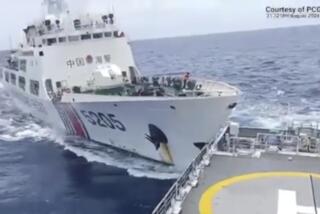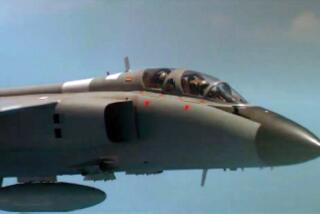Nuclear Issue Stalls U.S. Port Calls in China
- Share via
PEKING — China has been refusing for more than two months to grant permission for U.S. Navy ships to begin visiting Chinese ports, and a Reagan Administration official confirmed Monday that the delay has been caused by an argument over the question of nuclear weapons aboard the ships.
American diplomats in Peking have been saying only that the agreement has been delayed by “technical difficulties,” but the Administration official, speaking in Washington, said, “It is hung up on that (nuclear weapons) issue.” Speaking on condition that he not be identified, he added, “Until there is a resolution of this, the final details can’t be signed off. . . .”
No Commitment Made
He said the United States has reached no agreement with the Chinese “on what kind of weapons would be aboard any American ships that would stop in Shanghai. We didn’t make any kind of commitment.”
The controversy, which could develop into a serious setback for Sino-American relations, is reminiscent of the U.S. dispute earlier this year with New Zealand over the U.S. policy of refusing to declare whether particular Navy ships carry nuclear weapons.
It remains possible that the two sides will soon reach agreement on the first visit, which U.S. officials had hoped to arrange for later this month. But the proposed port call, which was earlier viewed as a public display of cooperation between U.S. and Chinese military officials, has instead become a source of friction and controversy.
The Administration source in Washington said that, in discussions with the Chinese, the United States has insisted on holding to its standard policy of neither confirming nor denying the presence of nuclear weapons on its ships. “That doesn’t seem to be enough for the Chinese,” he said.
A Pentagon official, also speaking on the condition of anonymity, said that State Department officials are trying to resolve the difficulty and that the Navy is awaiting its orders.
Another Administration official said that “we’ll know in a short time whether the visit will take place soon.” He said U.S. and Chinese officials are trying to find language dealing with the nuclear weapons question that “everyone can live with.”
At the same time, he said, if the port call depends upon the United States shifting its longstanding policy on refusing to disclose the presence of nuclear weapons, “the visit would not take place.”
“Fundamentally,” he added, “we’re quite close. . . . (But) until you have it locked in, anything is possible. There may not be a real problem. I think both sides want the visit to take place. But anything like this involves sensitivities.”
Internal Conflict Seen
Some analysts in Peking believe that China’s reluctance to approve the port call is the result of an internal conflict either within the regime headed by Deng Xiaoping or within the army over just how closely China should publicly align itself with the United States.
During the past six months, China and the Soviet Union have made their most concerted effort in more than two decades to ease the hostilities between the two countries. China has repeatedly sought to stress that it maintains an independent foreign policy and is not closely tied to either of the superpowers.
Chinese and U.S. officials said last year that they had agreed in principle to let U.S. Navy ships make their first port calls in China since the Communist takeover in 1949. The port calls would be the culmination of a series of visits and exchanges by military officials of the two countries over the last year.
At the beginning of March, U.S. officials believed an agreement on plans for the first port call was imminent. Officials at U.S. 7th Fleet headquarters in Japan were expected to announce arrangements for the visit within a matter of days, and they began to make elaborate plans, including arrangements for a band to play for the sailors in Shanghai. But the announcement never came.
U.S. Assurances Cited
The first public indication that a dispute over nuclear weapons was going on came April 10, when Hu Yaobang, general secretary of the Chinese Communist Party and the highest-ranking aide to Deng, told a group of reporters from Australia and New Zealand that Peking had been assured that U.S. ships visiting China would not be carrying nuclear weapons.
But that seemed to run counter to the U.S. policy of refusing to give such assurances, a policy that sparked controversy in Japan long before the rift between New Zealand and the United States.
New Zealand announced that it would refuse to let U.S. ships make port calls there because it could not obtain a guarantee that the ships would be conventionally powered and that there were no nuclear arms on board.
After Hu’s comment, U.S. officials quickly denied that they had given China the sort of assurances about nuclear weapons that they refused to give allies like Japan and New Zealand. They said that there had been no change in U.S. policy and that Hu’s remarks were the result of a mistake or misunderstanding.
Terse Statement Released
Five days after Hu’s remarks, China appeared to back off somewhat. In Australia, where Hu was about to arrive for a visit, the Chinese Embassy released a terse statement saying that “U.S. conventionally powered naval vessels may call at a Chinese port.” It did not mention any guarantees or agreements about nuclear weapons on the ships.
However, the Chinese statement went on to say, “There are questions remaining to be settled between the two sides” regarding the matter of U.S. Navy port calls.
If China concedes the possibility that the ships are carrying nuclear weapons and says it has gone along with the U.S. nuclear policy, it would embarrass Hu, the Communist Party leader. And it would undercut China’s recent efforts to portray itself as a champion of the anti-nuclear movement.
“It’s kind of hypocritical of China to take this (anti-nuclear) stance,” one Western diplomat said. “After all, they’ve got nuclear weapons themselves.”
Chinese Mistake Seen
This diplomat said he believes that Hu made a mistake last month, perhaps confusing promises that the ships would not be nuclear-powered vessels with the question of nuclear arms on the ships. Nevertheless, the diplomat said, “there are a lot of people on the Chinese side who don’t want to climb down from Hu’s statement.”
Another Western diplomat said he believes that the delays and the nuclear weapons dispute have already harmed U.S.-Chinese relations.
“Even if the visit finally takes place, the bloom is off now. The focus will be on the nuclear issue, not on the colorful return of the sailors,” he said. “And if the port call is canceled now, the U.S. is worse off than if they had never discussed the idea with China in the first place.”
An analyst for a country allied to the U.S. said he believes that the flap has proved at least of short-term benefit to the Soviet Union. “The Soviets are really enjoying this,” he said. “They don’t have to do a thing, either--just sit back and watch.”
Jim Mann reported from Peking and James Gerstenzang from Washington.
More to Read
Sign up for Essential California
The most important California stories and recommendations in your inbox every morning.
You may occasionally receive promotional content from the Los Angeles Times.













